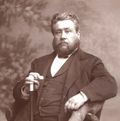Evil men understand not judgment: but they that seek the LORD understand all things.(Proverbios 28:5)
Better is the poor that walketh in his uprightness, than he that is perverse in his ways, though he be rich.(Proverbios 28:6)
Whoso keepeth the law is a wise son: but he that is a companion of riotous men shameth his father.(Proverbios 28:7)
He that by usury and unjust gain increaseth his substance, he shall gather it for him that will pity the poor.
He that turneth away his ear from hearing the law, even his prayer shall be abomination.(Proverbios 28:9)
Whoso causeth the righteous to go astray in an evil way, he shall fall himself into his own pit: but the upright shall have good things in possession.(Proverbios 28:10)
The rich man is wise in his own conceit; but the poor that hath understanding searcheth him out.(Proverbios 28:11)
Otras publicaciones relacionadas con "Proverbios 28:8":
Proverbios 28:8 - Referencia Cruzada
And he shall restore the lamb fourfold, because he did this thing, and because he had no pity. (2 Samuel 12:6)
He that hath not given forth upon usury, neither hath taken any increase, that hath withdrawn his hand from iniquity, hath executed true judgment between man and man, (Ezequiel 18:8)
If thou lend money to any of my people that is poor by thee, thou shalt not be to him as an usurer, neither shalt thou lay upon him usury. (Éxodo 22:25)
Take thou no usury of him, or increase: but fear thy God; that thy brother may live with thee. (Levítico 25:36)
All the brethren of the poor do hate him: how much more do his friends go far from him? he pursueth them with words, yet they are wanting to him. (Proverbios 19:7)
Though he heap up silver as the dust, and prepare raiment as the clay; (Job 27:16)
A good man leaveth an inheritance to his children's children: and the wealth of the sinner is laid up for the just. (Proverbios 13:22)
Hath given forth upon usury, and hath taken increase: shall he then live? he shall not live: he hath done all these abominations; he shall surely die; his blood shall be upon him. (Ezequiel 18:13)
That hath taken off his hand from the poor, that hath not received usury nor increase, hath executed my judgments, hath walked in my statutes; he shall not die for the iniquity of his father, he shall surely live. (Ezequiel 18:17)
For God giveth to a man that is good in his sight wisdom, and knowledge, and joy: but to the sinner he giveth travail, to gather and to heap up, that he may give to him that is good before God. This also is vanity and vexation of spirit. (Eclesiastés 2:26)
He that oppresseth the poor reproacheth his Maker: but he that honoureth him hath mercy on the poor. (Proverbios 14:31)

